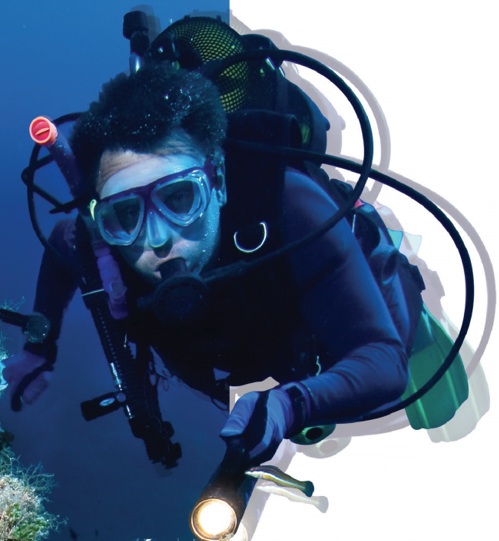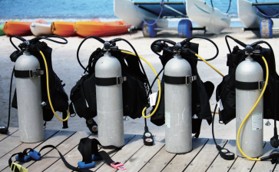
Think about the following questions.
1. Are you interested in seeing underwater life up close?
2. Why do many people enjoy scuba diving?
3. Are there any dangers involved in this activity?
VOCABULARY PREVIEW
Match each New Academic Word List(NAWL) word with the correct definition.
- cure _____
- array _____
- amongst _____
- actively _____
- competent _____
- nitrogen _____
- a. producing or involving movement, exertion, or other effort
- b. medication or remedy for some disease or illness
- c. a range; a varied collection
- d. having the necessary skills to do something well
- e. an odorless, colorless chemical that makes up a large part of the atmosphere
- f. within (a group)
SCUBA SAFETY

The popularity of scuba diving has exploded over the last few decades, with more than a million people trying the sport for the first time each year. Divers are drawn to the depths in the hopes of seeing exotic creatures and beautiful coral reefs. With all this interest, scuba diving has quickly become a billion-dollar industry, with providers1 actively competing to entice2 tourists by advertising not only the excitement but also the safety of their dives. So is diving into the unknown as safe as these providers claim?
In fact, when compared to other extreme sports, scuba diving is relatively risk free. Mountain climbing, hang gliding, and bull running all have far higher rates of injury. As long as a diver has learned how to use and maintain their apparatus3 properly and is able to follow a few straightforward underwater rules, the rewards far outweigh the risks.
So what should a diver do to remain safe?
One of the most important things to remember when diving is to practice the buddy system, which means one diver pairing up with another. These divers look out for each other before and during the dive and assist each other in the event of a problem. For example, they can help each other get into their diving equipment, make sure their buddy is not disoriented4 after entering the water, and make sure they don't get distracted and lose track of the other divers. If there is a problem with one diver's breathing apparatus, his or her buddy will share oxygen, actually taking the regulator5 out of his or her mouth and taking turns breathing with the buddy until they both can safely reach the surface and breathe air normally again.
While much of what a diver observes and experiences underwater is harmless, there are some creatures and situations that can be dangerous. Amongst known dangers, sharks generally come to mind first. Of course, some sharks, such as the tiger, mako, and hammerhead, are considered quite aggressive. But many other sharks, including the ones most commonly seen during dives, such as the nurse shark and sand shark, are not usually aggressive at all and are more likely to swim away from a diver than to attack.
But one marine life form divers should only observe from a distance is the sea snake. This creature is not usually aggressive but may become so if disturbed. Its poison is as potent6 as a cobra's, and there is no effective antidote7 for it. The jellyfish, sea wasp, and Portuguese man-of-war are also to be avoided at all costs. Even though they may look harmless and graceful floating in the water, they have nematocysts, which are small barbs8 that can deliver poisonous and painful stings that require immediate medical attention. The eel9 can also be dangerous. One of the most common kinds of eel is the moray. They don't usually bother people, but if a diver disturbs one resting in a dark hole or crevice, it might bite. The stingray is another kind of marine animal that's beautiful to watch, but divers must take care not to step on its barbed tail. This is a good reason for wearing diving boots; stingrays can burrow10 under the sand of the ocean floor and might not be easily spotted by divers. Although fatal attacks are almost unheard of, the danger is real: in 2006, TV wildlife expert Steve Irwin tragically died in a stingray attack.
Another danger involved with diving is nitrogen narcosis. This condition is caused by an increased concentration of nitrogen in the blood due to the high-pressure environment. It involves feelings of "drunkenness" and a slowing down of normal brain functions, which may cause a diver to have trouble communicating with a buddy, reading diving equipment, or even telling which way is up. No one knows why nitrogen has this effect on divers, but the cure is very easy. The diver should just start slowly ascending11, because the water pressure starts decreasing as the diver approaches the surface. Typical dives that go no deeper than eighteen to twenty-four meters rarely encounter any nitrogen narcosis problems; however, diving to thirty meters or more will noticeably affect most divers.
While there are some concerns about safety, people who are well educated about scuba diving, approach the activity responsibly with a competent buddy, and treat the marine environment with respect should have little trouble and lots of fun exploring the wide array of underwater attractions!
New Academic Word List
- provider 1 : n. a group or company that provides a specified service
- entice 2 : v. to attract
- apparatus 3 : n. equipment
- disoriented 4 : adj. lost or confused
- regulator5 : n. a part of scuba equipment that a diver puts in the mouth and breathes into
- potent 6 : adj. strong; powerful
- antidote 7 : n. a substance that counteracts a poison
- barb 8 : n. a sharp, pointed, hook-like structure
- eel 9 : n. a type of fish with a long, snakelike body
- burrow10 : v. to dig
- ascend11 : v. to go up
READING COMPREHENSION
A ‣ Mark each statement as true (T) or false (F) according to the reading.
- Scuba divers are more likely to get injured than climbers or hang gliders.
- True
- False
- Most underwater animals encountered by divers are not harmful.
- True
- False
- Eels are normally quite aggressive toward people.
- True
- False
- Nitrogen narcosis is caused by a lack of nitrogen in the blood.
- True
- False
- The cure for nitrogen narcosis is to move toward the surface.
- True
- False
B ‣ Choose the best answer according to the reading.
- Which statement would the writer most likely agree with?
- a. Most people do not take scuba safety seriously enough.
- b. Scuba diving is an activity for professionals only.
- c. People should not be afraid to try scuba diving.
- d. It should be harder to get scuba certification.
- The main responsibility of a buddy is to _____.
- a. help a diver breathe
- b. ensure diver safety
- c. identify marine life
- d. conduct underwater research
- Which of the following sharks is NOT considered aggressive?
- a. The hammerhead shark
- b. The sand shark
- c. The mako shark
- d. The tiger shark
- The word it in paragraph 6 refers to _____.
- a. poison
- b. distance
- c. the cobra
- d. the sea snake
C ‣ The following terms are explained in the reading. Write definitions for them.
- buddy system:
_____ - nematocyst:
_____ - nitrogen narcosis:
_____
SUMMARY
Fill in the blanks with the phrases in the box.
- gradually ascend
- pair up with
- extended period
- in the blood
- not disoriented
- should be avoided
If practiced safely, scuba diving can be a very enjoyable activity. Scuba-diving equipment allows a diver to breathe underwater for a(n) 1 _____. Scuba diving should be practiced responsibly because there are hazards involved. You should 2 _____ someone when diving. The other person can make sure you are 3 _____ after entering the water. While much of what a diver sees and experiences underwater is harmless, there are some situations that can be dangerous. Some marine life, like the sea snake, 4 _____. Another danger involved with diving is nitrogen narcosis, which is caused by a nitrogen imbalance 5 _____. The best thing to do for this problem is to 6 _____ to the surface.
VOCABULARY PRACTICE
Fill in the blanks with the words in the box. Change the form if necessary.
- actively
- amongst
- array
- competent
- cure
- nitrogen
- Many college courses require that students _____ participate in class discussions.
- Rates of depression are noticeably higher _____ people in certain jobs, such as health care workers.
- _____ is an element that occurs in all organisms, particularly in their DNA and RNA.
- Most local libraries now have a wide _____ of films and video games.
- No new business can succeed without hard-working, _____ employees.
- Because there are so many different types of cancer, it is unlikely there will ever be a single _____ for them all.
SUPPLEMENTAL READING
Scuba: Get Your Gear On

Modern scuba equipment was designed by engineer Emile Gagnan and naval lieutenant Jacques Cousteau, later famous as a marine explorer, during World War II. Along with oxygen tanks on their backs connected with hoses to a regulator, divers need such equipment as a mask, fins, a vest, and sometimes a diving suit. Scuba diving is definitely an equipment- intensive sport.
The mask is vital because the human eye is not designed to see well underwater. The mask covers the eyes with a plastic lens that enables divers to see about as well as they do above water. The mask also covers a person's nose. This is important to keep water out of the nose, as well as to allow a diver to exhale into the mask, helping to balance the pressure inside and outside of the mask.
Fins are like the tail fins on a dolphin. They help propel the diver through the water. A protective suit, while not always necessary, can help keep a diver warm and protect against bumps and scratches during a dive. If a diver enters water that is colder than sixteen degrees Celsius, he or she should wear a dry suit.
Finally, divers need help to sink underwater when they begin a dive and to return to the surface when they finish or have an emergency. The vest worn by a diver is called a buoyancy compensator, or BC. It is attached to the air tank that divers wear on their backs. Divers deflate the BC when they start their dive and can later refill it with air to help them return to the surface and float there, if necessary.
Fill in the blanks with information from the reading.
- The designers of modern scuba equipment were _____ and _____.
- One reason we need a mask is because our eyes don't naturally _____.
- A diver refills the BC when he or she wants to _____.

Leave a comment
Load more